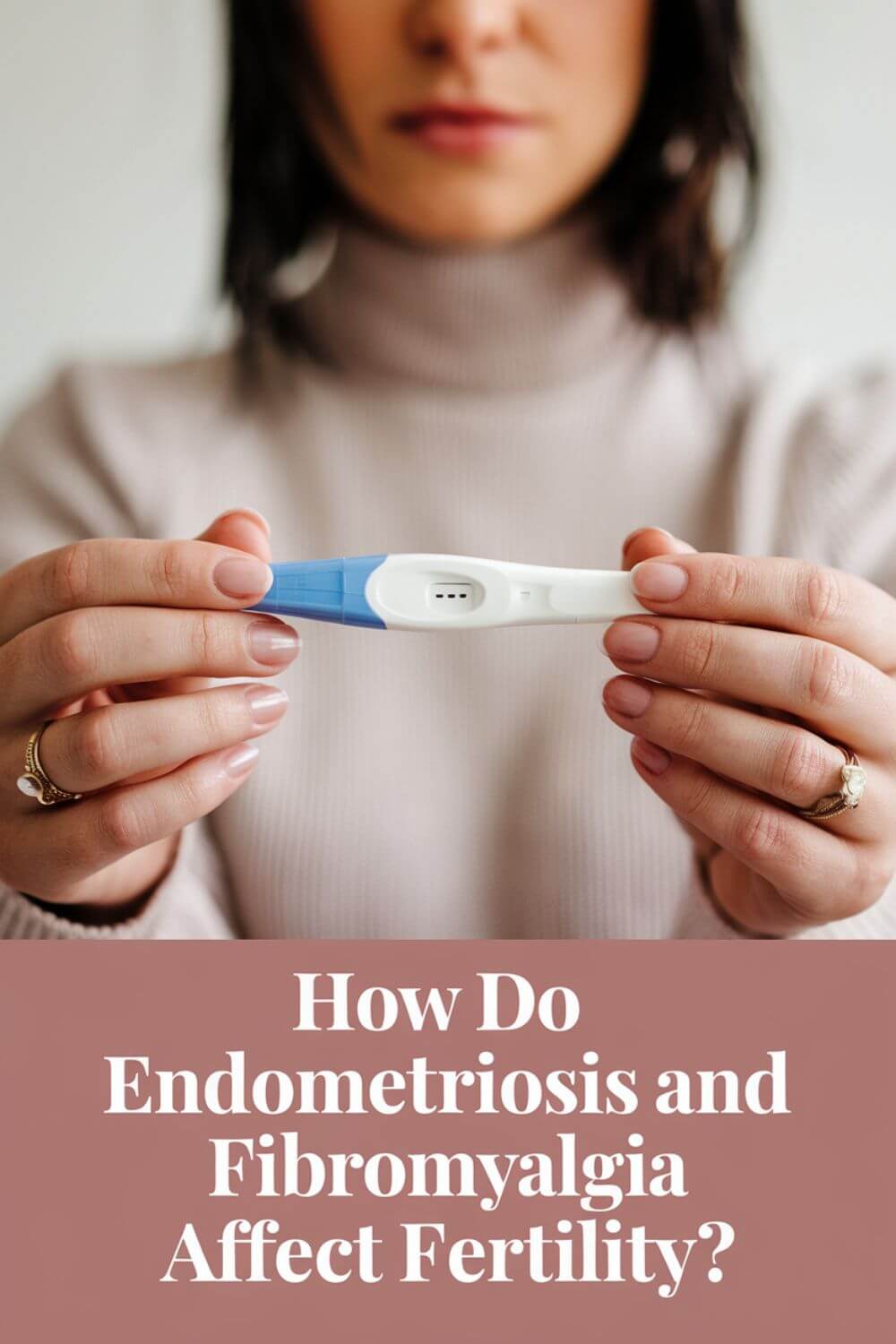How do Endometriosis and Fibromyalgia Affect Fertility?
My wife has endometriosis and fibromyalgia – two separate conditions that can have an impact on fertility, and her stage 4 deep infiltrating endometriosis is so advanced it prevents her from having kids and us from having a family.
Yes, endometriosis, sure… But what about fibro?
While fibromyalgia itself does not directly impair fertility, individuals with fibromyalgia may have overlapping conditions that can make it more challenging to conceive. On the other hand, endometriosis is known to affect the reproductive organs and can lead to infertility. Understanding the relationship between these conditions and fertility is crucial for those who are trying to conceive.
My key takeaways we are going to get out of here today:
- Fibromyalgia does not directly cause infertility, but individuals may have other conditions that contribute to difficulties getting pregnant.
- Endometriosis can affect the reproductive organs and lead to infertility.
- Fibromyalgia symptoms often worsen during pregnancy, but most pregnancies with fibromyalgia have successful outcomes.
- Individuals with fibromyalgia should discuss their medications with their doctor before planning to get pregnant.
- Seeking support and professional guidance is important when dealing with fertility challenges related to endometriosis and fibromyalgia.
- Understanding Endometriosis and Its Effects on Fertility
- The Link Between Fibromyalgia and Reproductive Health
- Overlapping Conditions: Fibromyalgia and Endometriosis
- Managing Fibromyalgia During Pregnancy
- Successful Pregnancies with Fibromyalgia
- Medication Considerations for Fibromyalgia and Pregnancy
- Seeking Support and Professional Guidance
- Lifestyle Factors and Fertility
- Conclusion on How do Endometriosis and Fibromyalgia Affect Fertility
- Source Links for How do Endometriosis and Fibromyalgia Affect Fertility
Understanding Endometriosis and Its Effects on Fertility
Endometriosis is a condition in which the tissue that normally lines the uterus grows outside of it, causing a range of symptoms and potential complications. This abnormal tissue growth can affect fertility in various ways.
One of the main ways endometriosis impacts fertility is by causing the formation of scar tissue in the pelvic area. This scar tissue can block or obstruct the fallopian tubes, preventing the eggs from reaching the uterus for fertilization. Additionally, endometriosis can cause inflammation and hormonal imbalances, which can interfere with ovulation and the release of healthy eggs.
Moreover, endometriosis can also affect the quality of eggs and the ability of the fertilized embryo to implant properly in the uterus. The excessive tissue growth can create an unfavorable environment for embryo implantation and increase the risk of miscarriage. These factors combined can contribute to difficulties in conceiving for individuals with endometriosis.

Endometriosis Fertility Treatment and Pregnancy Complications
If you have been diagnosed with endometriosis and are struggling to conceive, there are fertility treatments available that can help. These may include medications to stimulate ovulation, surgical removal of endometriosis tissue, or assisted reproductive technologies such as in vitro fertilization (IVF).
It is important to note that while these treatments can improve the chances of getting pregnant, they may not guarantee a successful pregnancy. Endometriosis can still pose risks during pregnancy, such as an increased likelihood of preterm birth, cesarean delivery, and complications like placental abnormalities. Close monitoring by a healthcare provider specializing in reproductive health is essential throughout the pregnancy journey to ensure the best possible outcomes.
Endometriosis and Infertility: Seeking Professional Guidance
“Living with endometriosis and trying to conceive can be a challenging journey. It is crucial to seek the guidance of a healthcare provider with expertise in reproductive health to develop a personalized treatment plan tailored to your specific needs.” – Dr. Smith, fertility specialist.
If you are concerned about your fertility due to endometriosis or have been trying to conceive without success, it is recommended to consult with a fertility specialist or reproductive endocrinologist. These professionals can provide a comprehensive evaluation, diagnose any potential fertility issues, and recommend appropriate treatments.
Remember, fertility challenges related to endometriosis can be complex, but with the right support and guidance, many individuals with this condition go on to have successful pregnancies. Stay informed, seek professional help, and explore the options available to you on your journey to starting or expanding your family.
| Treatment Options for Endometriosis-Related Infertility | Success Rates |
|---|---|
| Medication to stimulate ovulation | Varies; success depends on individual factors |
| Laparoscopic surgery | Improves fertility rates in mild to moderate endometriosis cases |
| In vitro fertilization (IVF) | Higher success rates compared to other treatments; beneficial for severe endometriosis or other infertility factors |

The Link Between Fibromyalgia and Reproductive Health
While fibromyalgia itself may not directly impair fertility, individuals with the condition may experience challenges related to reproductive health. Research suggests that fibromyalgia does not have a significant impact on fertility, but it is important to note that many individuals with fibromyalgia may have overlapping conditions that can affect their ability to conceive.
Examples include endometriosis, polycystic ovary syndrome (PCOS), and pelvic inflammatory disease. These conditions can make it more difficult to get pregnant and may require specialized treatment.
It is worth mentioning that fibromyalgia symptoms often intensify during pregnancy. Many individuals with fibromyalgia report increased pain, fatigue, anxiety, and depression during this time. However, it is important to note that most pregnancies with fibromyalgia have successful outcomes, with healthy babies and no long-term worsening of symptoms. It is crucial for individuals with fibromyalgia who are planning to get pregnant to consult with their healthcare provider, as certain fibromyalgia medications may not be safe for the baby.
The journey to parenthood can be challenging for individuals with fibromyalgia, but with proper support and guidance, it is possible to navigate these obstacles. It is recommended to seek the assistance of a healthcare provider who specializes in both fibromyalgia and reproductive health.
They can provide personalized advice and treatment options to optimize your chances of conceiving and having a healthy pregnancy. Additionally, joining support groups or online communities for individuals facing similar challenges can provide emotional support and a sense of belonging as you navigate the complexities of fibromyalgia and reproductive health.

Overlapping Conditions: Fibromyalgia and Endometriosis
It is not uncommon for individuals with fibromyalgia to also have endometriosis, which can further complicate their reproductive health. Endometriosis is a condition where the tissue that lines the uterus grows outside of it, causing pain, inflammation, and fertility challenges. Research suggests that the prevalence of endometriosis is higher in individuals with fibromyalgia compared to the general population.
Both fibromyalgia and endometriosis can cause chronic pain, fatigue, and other symptoms that can make it more difficult to conceive. Additionally, endometriosis can lead to the formation of scar tissue and adhesions, which can disrupt the normal functioning of the reproductive organs and impede fertility. For individuals with fibromyalgia and endometriosis, the combination of these conditions can create a complex set of challenges when it comes to achieving pregnancy.
It is important for individuals with fibromyalgia and endometriosis to work closely with their healthcare providers to manage their symptoms and explore treatment options that can improve their chances of conception. This may involve a combination of pain management strategies, hormonal therapies, and fertility treatments. By addressing both fibromyalgia and endometriosis, individuals can optimize their reproductive health and increase their chances of successful pregnancy.
| Fibromyalgia and Infertility: |
|---|
| • Research suggests that fibromyalgia does not directly impair fertility. |
| • However, fibromyalgia can contribute to difficulties getting pregnant due to overlapping conditions like endometriosis. |
| • It is important for individuals with fibromyalgia who are planning to get pregnant to discuss their medications with their doctor, as some fibromyalgia medications may not be safe for the baby. |

Managing Fibromyalgia During Pregnancy
Pregnancy can bring about changes in fibromyalgia symptoms, and it’s important to be prepared and have a plan in place for managing the condition during this time. While fibromyalgia itself does not directly impair fertility, individuals with the condition may have other overlapping conditions that can make conception more challenging. It’s essential to work closely with your healthcare provider to ensure the best care for both you and your baby.
During pregnancy, fibromyalgia symptoms may fluctuate. Some women experience a decrease in pain and fatigue, while others may find that their symptoms worsen. Hormonal changes, weight gain, and increased stress levels can all contribute to these fluctuations. It’s crucial to listen to your body and prioritize self-care during this time.
“Pregnancy can be a challenging time for women with fibromyalgia, as they may face increased pain, fatigue, and emotional distress,” says Dr. Sarah Johnson, a rheumatologist specializing in fibromyalgia. “However, it’s important to note that most pregnancies with fibromyalgia have successful outcomes, with healthy babies and no long-term worsening of symptoms.”
Here are some strategies that may help in managing fibromyalgia during pregnancy:
- Regular exercise: Low-impact exercises, such as prenatal yoga or swimming, can help relieve pain and improve flexibility. Consult with your healthcare provider for exercise recommendations.
- Healthy diet: Eating a nutritious diet can support overall health and help manage fibromyalgia symptoms. Include plenty of fruits, vegetables, whole grains, and lean proteins in your meals.
- Stress management: Practice relaxation techniques, such as deep breathing exercises, meditation, and gentle stretching, to reduce stress and promote well-being.
- Sleep hygiene: Prioritize quality sleep by establishing a regular sleep routine, creating a comfortable sleep environment, and practicing good sleep hygiene habits.
It’s important to note that some fibromyalgia medications may not be safe to use during pregnancy. Always consult with your healthcare provider before making any changes to your medication regime. They can provide guidance on the most appropriate treatment options that are safe for both you and your baby.
Managing fibromyalgia during pregnancy requires careful planning and open communication with your healthcare provider. While pregnancy can bring about changes in symptoms, most pregnancies with fibromyalgia have successful outcomes. By adopting a healthy lifestyle, practicing stress management techniques, and working closely with your healthcare team, you can navigate pregnancy with fibromyalgia and ensure the best care for you and your baby.
| Medication | Safety during pregnancy |
|---|---|
| NSAIDs (Nonsteroidal anti-inflammatory drugs) | Avoided in the third trimester |
| Tramadol | Considered safe, but used with caution |
| Antidepressants | Some may be safe for use during pregnancy, while others should be avoided. Consult with your healthcare provider. |

Successful Pregnancies with Fibromyalgia
Despite the challenges that fibromyalgia may present, many individuals with the condition have been able to have successful pregnancies and healthy babies. While fibromyalgia symptoms often worsen during pregnancy, with increased pain, fatigue, anxiety, and depression, most pregnancies with fibromyalgia have positive outcomes.
Research suggests that fibromyalgia does not directly impair fertility. However, individuals with fibromyalgia may have overlapping conditions that can make it more difficult to conceive. These conditions include endometriosis, polycystic ovary syndrome, and pelvic inflammatory disease. Although it is rare for fibromyalgia to directly cause infertility, it can contribute to difficulties getting pregnant.
It is important for individuals with fibromyalgia who are planning to get pregnant to consult with their healthcare provider. They can provide guidance on managing fibromyalgia symptoms during pregnancy and ensure that any medications being taken are safe for the baby. Some fibromyalgia medications may need to be adjusted or discontinued during pregnancy to minimize potential risks.
Despite the challenges, many women with fibromyalgia have successfully carried pregnancies to term and delivered healthy babies. With the right support from healthcare professionals, including obstetricians, rheumatologists, and pain management specialists, individuals with fibromyalgia can navigate the unique challenges of pregnancy and motherhood while minimizing the impact on their overall well-being.
| Fibromyalgia and Pregnancy | Fibromyalgia and Healthy Babies |
|---|---|
| Increased pain, fatigue, anxiety, and depression | Despite symptoms, most pregnancies have positive outcomes |
| Consult healthcare provider for guidance | Support from healthcare professionals is crucial |
| Adjust or discontinue medications if necessary | Safe management of medications during pregnancy |
While fibromyalgia can present unique challenges during pregnancy, it is essential to remember that many individuals with the condition have successfully become parents. By working closely with healthcare providers and prioritizing self-care, individuals with fibromyalgia can increase their chances of having a healthy pregnancy and delivering a happy, healthy baby.

Medication Considerations for Fibromyalgia and Pregnancy
If you have fibromyalgia and are planning to get pregnant, it’s crucial to have a conversation with your doctor about your medications to ensure the safety of both you and your baby. While there is limited research on the effects of specific fibromyalgia medications during pregnancy, some medications are generally considered safe, while others may pose risks and should be avoided.
“During pregnancy, it is important to balance the management of fibromyalgia symptoms with the potential risks of medication use,” explains Dr. Sarah Thompson, a reproductive health specialist.
“Some medications commonly used to treat fibromyalgia, such as nonsteroidal anti-inflammatory drugs (NSAIDs) and certain muscle relaxants, are generally considered safe during pregnancy when used as directed. However, other medications, including opioids and certain antidepressants, may carry risks for the developing baby and should be avoided or used with caution.”
If you are currently taking medications for fibromyalgia and are planning to conceive, it’s important to talk to your healthcare provider as early as possible. They will be able to provide guidance on which medications to continue, adjust, or discontinue in order to minimize potential risks. It may be necessary to gradually taper off certain medications before conception to ensure their full elimination from your body.
Although it is essential to manage fibromyalgia symptoms during pregnancy, non-pharmacological approaches should also be considered. These may include physical therapy, gentle exercise, relaxation techniques, and stress management strategies. Your healthcare provider can provide guidance on these alternative therapies, as well as recommend supportive services such as counseling or support groups to help you cope with the physical and emotional challenges of pregnancy while living with fibromyalgia.
| Medication | Safety during Pregnancy |
|---|---|
| NSAIDs (such as ibuprofen, naproxen) | Generally considered safe, but should be taken at the lowest effective dose and for the shortest possible duration |
| Muscle relaxants (such as cyclobenzaprine) | Generally considered safe, but should be used with caution and as prescribed |
| Opioids (such as codeine, oxycodone) | Should be avoided due to potential risks for the developing baby |
| Antidepressants (such as duloxetine, amitriptyline) | Some antidepressants may be safe during pregnancy, but others should be avoided or used with caution. Talk to your doctor for personalized recommendations. |

Seeking Support and Professional Guidance
Dealing with fertility challenges can be emotionally and physically taxing, but seeking the guidance and support of healthcare professionals and support groups can make a significant difference. When facing fertility issues related to endometriosis and fibromyalgia, it is important to have a team of experts who understand the complexities of these conditions and can provide specialized care.
Start by consulting with a reproductive health specialist or a fertility doctor who has experience in treating individuals with endometriosis and fibromyalgia. They can evaluate your specific situation, conduct necessary tests, and develop a personalized treatment plan that takes into account your unique needs and challenges.
In addition to medical professionals, joining a support group can provide valuable emotional support and practical advice. Connecting with others who are going through similar experiences can help alleviate feelings of isolation and provide a sense of community. Support groups can offer a safe space to share experiences, ask questions, and learn from others who have successfully navigated fertility challenges with endometriosis and fibromyalgia.
Remember, you are not alone in your journey. With the right support and guidance, many individuals with endometriosis and fibromyalgia have successfully overcome fertility challenges and achieved their dream of starting or expanding their family. Take the first step by reaching out to healthcare professionals and support groups who can provide the help you need along the way.
Lifestyle Factors and Fertility
Making positive lifestyle choices and managing your endometriosis and fibromyalgia can positively influence your fertility journey. While these conditions may present challenges, there are various lifestyle factors that you can focus on to optimize your chances of conceiving and having a healthy pregnancy.
Diet: A well-balanced diet rich in fruits, vegetables, lean proteins, and whole grains can support reproductive health. Certain foods, such as those containing antioxidants and omega-3 fatty acids, may have beneficial effects on fertility. Consult with a healthcare provider or a registered dietitian to develop a personalized nutrition plan that suits your specific needs.
Exercise: Engaging in regular physical activity can help regulate hormones, reduce stress, and maintain a healthy weight, all of which can positively impact fertility. However, it’s important to find a balance and avoid overexertion, as excessive exercise can potentially disrupt ovulation. Consult with your healthcare provider to determine a suitable exercise routine for you.
Stress Management: Stress can have a significant impact on fertility. Implementing stress-reducing practices, such as mindfulness meditation, yoga, deep breathing exercises, and engaging in activities you enjoy, can help manage stress levels. Additionally, seeking support from friends, family, or a therapist can provide emotional support during your fertility journey.
| Managing Endometriosis and Fibromyalgia for Fertility |
|---|
| – Maintain regular communication with your healthcare provider to ensure your treatment plan is optimized for your fertility goals. |
| – Follow a consistent sleep schedule to promote better sleep quality and overall well-being. |
| – Practice self-care and listen to your body. Take time for relaxation, engage in activities that bring you joy, and prioritize your overall well-being. |
Remember, fertility journeys can be unique and complex. It’s essential to work closely with your healthcare provider to develop a personalized plan that addresses your specific needs and goals. By focusing on lifestyle factors and managing your endometriosis and fibromyalgia, you can enhance your chances of achieving a successful pregnancy.
Conclusion on How do Endometriosis and Fibromyalgia Affect Fertility
Understanding how endometriosis and fibromyalgia can affect fertility is crucial for individuals navigating these conditions, and seeking expert guidance is essential in making informed decisions about reproductive health.
Research suggests that fibromyalgia does not directly impair fertility. However, individuals with fibromyalgia may also have other conditions that can make it more difficult to conceive, such as endometriosis, polycystic ovary syndrome, and pelvic inflammatory disease.
While it is rare for fibromyalgia to directly cause infertility, it can contribute to challenges in getting pregnant. Furthermore, fibromyalgia symptoms often worsen during pregnancy, with increased pain, fatigue, anxiety, and depression.
Despite these challenges, most pregnancies with fibromyalgia have successful outcomes, with healthy babies and no long-term worsening of symptoms. It is important for individuals with fibromyalgia who are planning to get pregnant to discuss their medications with their doctor, as some fibromyalgia medications may not be safe for the baby.


About Me
Hi, I’m Lucjan! The reason why I decided to create this blog was my beautiful wife, who experienced a lot of pain in life, but also the lack of information about endometriosis and fibromyalgia for men…
